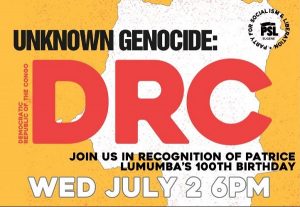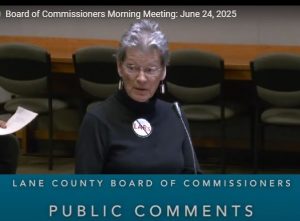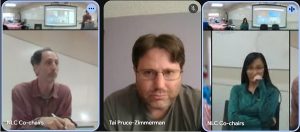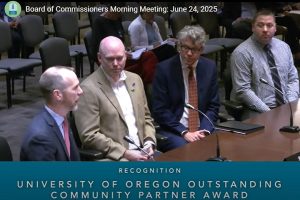Councilor Emily Semple: ‘We listened and responded’
5 min read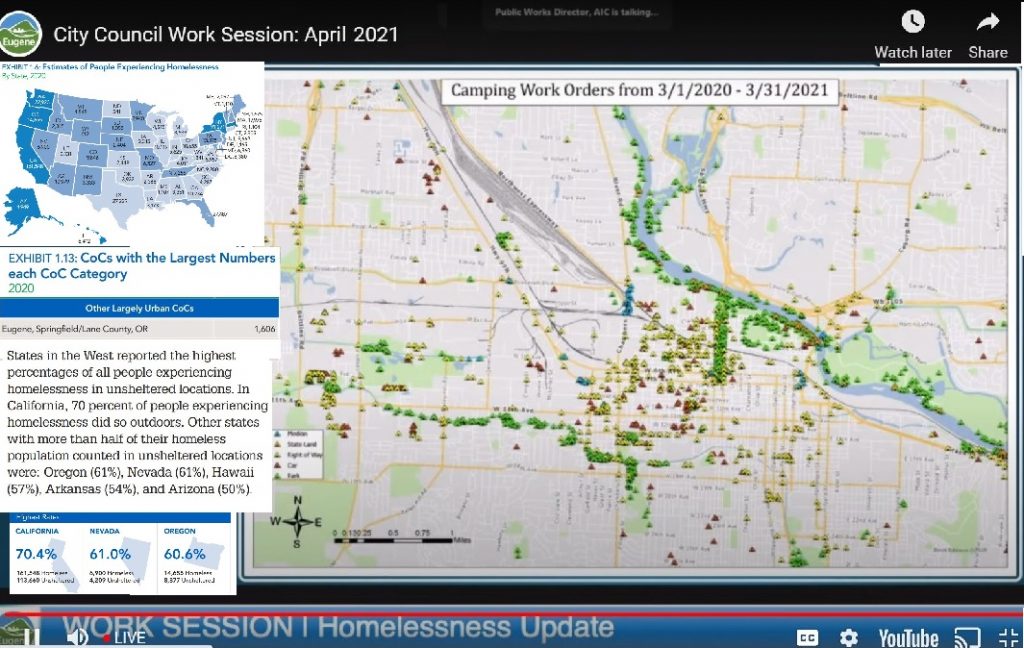
Eugene community organizations have stepped up in the absence of City and County action during the growing crisis, officials said.
Mayor Lucy Vinis: We are facing a humanitarian crisis, a huge humanitarian crisis.
Eugene Mayor Lucy Vinis spoke on homelessness at April Council and City Club meetings.
Mayor Lucy Vinis: [00:00:12] The scale and the scope of this humanitarian crisis and the incremental pace at which we are able to continue to create new shelter and housing opportunities means that we are simply not going to be able to shelter or house the roughly 2,000 people living in our parks, open spaces, and rights of way. In the short term, in the now, we’re just not going to get there that fast.
As you look to the city to solve both the acute crisis and the ongoing concerns of homelessness, please recognize the structure and the budget of the city government that you have. We have Police and Public Works to address this issue. We do not have this level of social services in our city structure.
John Quetzalcoatl Murray: [00:01:01] Assistant City Manager Kristie Hammitt.
Thank you for supporting
local citizen journalism
Kristie Hammitt: [00:01:04] in January, HUD provided their 2020 Annual Homeless Assessment Report to Congress. This is the fourth consecutive year homelessness increased nationwide. In 2020 March, the first time since data collection began, that more individuals were unsheltered than sheltered. I’m going to say that again because it’s really important to what we’re talking about today. So 2020 was the first time that more individuals were experiencing being unsheltered than sheltered. The report also states that 62 percent of the homeless individuals in Oregon are unsheltered.
As we think a little bit more locally, and what’s happening in Lane County: In February, 3,301 people experiencing homelessness accessed services during the month. Of that, about 2,500 of that population, or roughly 75 percent, reside in Eugene.
John Quetzalcoatl Murray: [00:01:59] Public Works Director Matt Rodrigues showed maps of unhoused citizens. More people are living in cars.
Public Works Director Matt Rodrigues: [00:02:07] There’s a concentration of people along waterways, near I-105, in West Eugene, in parks, right-of-ways, and in vehicles, just across the city. It really is all across the city. The vehicle camping have been sharply increasing. This has resulted in significant impacts to residents and businesses adjacent to the vehicle camping, and we know this is particularly acute in the West Eugene commercial and industrial areas. Impacts have included blocking streets and access for large commercial vehicles, large amounts of trash, human waste…
John Quetzalcoatl Murray: [00:02:38] Mayor Vinis said social services are meant to be provided by Lane County.
Mayor Lucy Vinis: [00:02:43] Our partnership with the County is absolutely critical. Health and Human Services is the largest department of the County. It is what they do. I am continuing and increasingly advocating for the County to expand their investment in outreach. It is one of the 10 recommendations of the TAC report. In the long-term, sustainable solutions will be built on county, state and federal investment.
John Quetzalcoatl Murray: [00:03:10] Mayor Vinis recognized local community groups that bridged service gaps over the winter.
Mayor Lucy Vinis: [00:03:16] It’s a testament to our community, the number of grassroots and neighborhood groups that have stepped up to help. So there are familiar names: White Bird and Occupy Medical and Community Supported Shelter, Carry It Forward. But there’s new groups: The Way Home, Black Thistle. So there’s a large constellation of providers and we’re working hard to coordinate closely with them. It may lead to some different decisions locally about how we structure our service delivery. So we clearly need better coordination and more resources, and we need to allocate those in the most effective way possible.
So the question is out there: Should the city and the County consider developing a joint housing and homelessness division as they have done in Portland and Multnomah County? Would the public support a new revenue source, a bond, a levy, a fee, some form of tax that would support those more robust services? How does the community envision the city stepping up into this role and envision that partnership with the city and the County?
John Quetzalcoatl Murray: [00:04:16] The City moved to protect the human rights of the unhoused. Council approved an idea brought forward late last year through the Human Rights Commission.
Councilor Matt Keating: [00:04:26] Thank you. Look, this is a big deal today. We will be passing an amendment to our code to define unhoused status as it relates to bias crime and intimidation. That is a big deal and an historic moment.
Councilor Claire Syrett: [00:04:43] I am really glad that we’re adding unhoused status to our list of bias crimes. If they are a victim of a crime and it shown that they were targeted because of their housing status, that we can have enhanced penalties for that activity.
City Prosecutor Travis Smith: [00:05:02] An intimidation charge, or bias in the new chapter four, is a misdemeanor charge that can be sentenced anywhere from zero days all the way up to 108. So it’s essentially akin to a class B misdemeanor, like Menacing or anything else.
Statutorily or changing the city code, you can change the minimum and maximums of the intimidation or bias crime to the maximum allowed by law, which is 365 days in jail. That’s a definition of a misdemeanor, right? It’s gotta be less than that. So you could do that. Uh, and that is a signal to prosecutors to signal to judges and everyone else involved in the process that City Council has said, uh, and the City has said, this is where we placed this at the continuum of things.
Councilor Mike Clark: [00:05:51] I, for one, want to make a statement. That type of activity in our community is no longer in any way acceptable. And we will be punishing people who engage in it to the maximum extent of the law. It’s important.
Councilor Emily Semple: [00:06:08] I’m really proud to vote for this. I just want to put another asterisk, that we listened and we responded.
